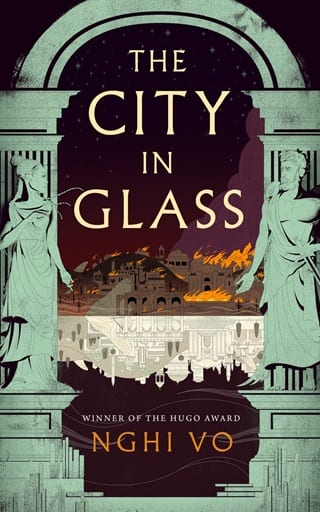Chapter Twenty-One
TWENTY-ONE
Shani did not stay in Azril, no matter what Vitrine promised her, and the angel went with her when her year was up, taking up a sailor’s kit bag and joining the crew as if he was meant to be there.
“I’ll stay with her at least until she gains Brid,” he said as Vitrine shadowed them down to the docks. They were full again, with pennants and flags from all over the world. It was not what it had been the night the angel and his brothers came over the water, but Vitrine noted absently that it was getting harder to remember that older harbor when this one was so very lively with sailors, smugglers, spies, and soldiers.
“And then where will you go?” she asked, only curious, but it made him smile, white teeth flashing in his dark beard.
“I haven’t been away from the city for a while. They surely must have built that basilica in Combes by now, and there’s that rumor of the horned white snake somewhere in the sacred springs of Soeur Martine. They say it can heal anything with just the touch of its horn.”
“Oh, if you find the snake, bring it back here. It can live in one of the Old Town wells,” Vitrine said, briefly distracted, and then she frowned, shaking her head.
“When should I come back?” he asked, and Vitrine shrugged, her shoulders sharp.
“Why in the world should it matter to me?”
“It has never been my lot to question why,” the angel said almost primly, and then, softer, “ Will I be allowed back if I leave?”
Vitrine lifted her chin proudly, crossing her arms over her chest. In her pocket was a palm-sized treatise on the wild horses of Mato Lorno, who traveled the mountains in an enormous elliptical circuit. Every spring found them in the same sheltered valley. Foals born late in the peaks knew their way to this valley, and they continued to know it even when they had been broken to the saddle and the bridle, their shod hooves kicking up anxious and eager sparks when they were ready to go home.
“I don’t stand guard on the docks, barring the way to those who come,” she said haughtily.
“And if I come through the mountains?” There was a slight sway to his voice as if he had remembered something of the hypnotic nature of words, how a sung chant and reply could bury itself in your ear, and then your mind, and then your heart.
“Then you have come through the mountains,” Vitrine exclaimed. “What do I care?”
“But you will not bar my way?”
“It is not my business where you go.”
It looked for a moment as if the angel wanted to say something more, but then he shook his head, and turned, gaining the ship just as the sails unfurled and billowed out with a snap.
She watched Shani watching her from the deck, waving to each other until the ship was just a dark speck on the horizon. She was waving to Shani, who she knew she would never see again, and of course she was waving to no one else.
For all that she had grown accustomed to the angel’s questions and wry comments, she truly did not miss him at all for the first ten years or the ten after that. There was simply too much going on to think of angels. There was a revolution brewing in the city, too short-sighted and too little concerned with material matters to last long, but she thought that they might do some damage that she could ill afford when the city still felt so tender and new.
She watched anxiously as they broke to riots one hot summer day, and in the end, her Azril was not hurt at all, not a single building sacked, not a single plinth toppled. It was something of a successful movement, if she was going to be entirely fair, and it was not as if she liked the companies in town who paid in scrip only accepted by the companies’ own shops. She had found the gray tickets for fish and meat and medicine and vegetables to be offensive, a nothing that pretended to be something, and she startled herself by marching with the mob, shouting and fighting and rolling from the heart of the west side all the way to the outskirts of the town where the companies, mining mostly, some ceramics, were stationed.
She thought it would be a rather lot of yelling for little at all, and she had shrieked with delight when they came out and burned a handful of the greasy gray tokens to show that they had succeeded.
Things got better, things got worse. A rainy spring brought a sickness to the water, and many died. Refugees arrived from some war over the mountains, and many were born. One of them, a fat man with a grave face and dragon-fire burns up his arms, brought with him bags of ruby frit and copper as well as a long steel pipe that let him blow spheres of glass, speckled with red and blue, fantastically delicate and sharper than serpent’s teeth when shattered.
He tempted Vitrine into meeting with him at Pike’s Crossing, which had a reputation for haunted deals. It was something of a private amusement to Vitrine, because Pike’s Crossing had once been Verdant, the center of the jewelers district in Azril-that-was, and therefore one of the most luxurious places in the city.
Still she met with him, and when he showed her his glass, baubles and goblets and lenses and knives, she showed him to a certain well where a man twenty years before had buried a fortune. The man had died of a knife to the side of his neck before he could come back to collect, and Vitrine shooed his ghost away as the glassblower left with enough gold to start his own shop.
“Oh shush,” Vitrine said to the reproachful ghost. “I only want good glass in the city again.”
Sometime later, when the glassblower’s son started to grind lenses for the observatory that was being built on the hill, Vitrine found herself wondering where the angel had gone. His wings in her chest were quiet, stirring in subdued response when she touched them, but otherwise she had nothing of him, no new citizens, no cunning lanterns from Muying, no ivory aviaries filled with strange birds or reptiles.
It irritated her to be so irritated with his absence, and so for another ten years, she locked away all thought of him and worked on the observatory on the hill, watching the lenses grow larger and clearer, bringing the heavens to earth and submitting the decorous stars to mortal eyes.
Sometimes, shortly before dawn, when the astronomers were piled up like puppies in exhausted, satisfied sleep, Vitrine took her place at the eyepiece, scanning the small section of the sky it encompassed. The angel’s home was no more in the sky than her own homeland lay beneath the earth, but there was some correspondence, she thought, in the glitter of the fading morning stars, in the way the black became blue with no clear line to divide them.
“They won’t let him back in,” she said. “They wouldn’t dare.”
Inside her glass case, his wings—her wings—beat fretfully, and she hummed a soft song to calm them.
“He’s not there,” she said to the sleeping astronomers. “That means that he’s somewhere here, and that’s all I care about.”
There was actually a great deal to care about in Azril, as the time picked up speed again and the years started to spin around her. There were buildings that wished to go up, and buildings that needed to come down, another spot of plague which was not as terrible as the first but still brought back bad memories. There was a brief trend for stampeding horses through the blocked streets. Of course there was food to eat and fortunes to lose. Someone developed a recipe for fried dough wrapped around salty pork, sweet strips of pickled radish and raw onions, and they were suddenly selling it everywhere.
A dancing girl from Sui awakened the memory of an old promise, and Vitrine went to the greenhouses, upsetting the careful work of the horticulturists to bloom splashy white blossoms in the midst of their reds and blues and yellows. The white flowers had a fleshy translucence to their thick petals, nearly glowing in natural light. They were a great favorite of the churches in Azril, of which there were now several, and after they were cast spent into the trash, they seeded and their seeds took root in whatever soil they could find. In the space of two years, they’d gone from rare to as common as cats. People grew them by their doorsteps, lovers snatched up great handfuls to give to their sweethearts, and of course they were scattered across the graves of those who died nameless in Azril, far from home and uncomforted except for those glorious white flowers.
Every day the sun rose on Azril, and Vitrine forgot that she was trying to bring the city back to what it was. Instead, she threw herself into making it what it would become. It was a labor of love and obsession, a single patch of pavers as likely to catch her attention as Shani’s library, now one of the greatest in the region.
The library had become her favorite, and in its roots, she saw the anxious young man who had died with all the rest that fateful night, and also Jinan’s need to know the world and Juana’s need to weigh it and Alex’s curiosity and Shani’s cleverness in giving a demon precisely what she wanted.
Vitrine spent a few years as one of the custodians of the books, answering only to the Lord Mayor and funding the collection from the pockets of those who sought its wisdom, but she quickly realized that she much preferred to be a patron.
She had her cell on the third floor, the door gated with a curlicue design of wrought black iron, and when she found something that she wanted to read through to the finish, she locked it in there so it would be hers until she was done.
Vitrine had liked to read before, but now in her library, she loved it, and she began most dawns there, sipping the strong coffee they imported from L’koga and Tesh, reading a romance or an engineering manual or a speculation on the nature of demons and angels. She nodded sagely when they got something right and snickered when they, more often, got a thing wrong.
She was reading when the first cannonball fired from the army come to the gates struck the western wall, and suddenly Azril was at war.
 Fullepub
Fullepub 



